PS Gahlaut Shares Optimal Strategies for Mastering Sugarcane Care in Rabi Season
Feb 12, 2024

VMPL
New Delhi [India], February 12: Sugarcane cultivation is a vital component of agriculture in India, contributing significantly to the sugar and bioenergy industries globally. Per reports, India holds the position of the second-largest global exporter of sugarcane. "The majority of its exported sugarcane is directed towards countries such as Pakistan, Sri Lanka, and the United States," says Industry expert and the Managing Director of Indian Potash Limited (IPL), PS Gahlaut. As farmers gear up for the Rabi season, PS Gahlaut provides invaluable insights into mastering sugarcane care through optimal strategies for irrigation, weed control, and fertilizer management.
Irrigation Techniques for Optimal Sugarcane Growth
In the pursuit of maximizing sugarcane growth and yields, "Adhering to precise irrigation techniques is paramount" quotes Gahlaut. According to PS Gahlaut, a recognized authority in agriculture, the emphasis lies on maintaining optimal moisture levels using advanced methods such as drip irrigation, soil moisture monitoring, and strategic water application scheduling. "These techniques not only contribute to the conservation of water resources but also play a crucial role in ensuring that sugarcane crops receive the precise amount of moisture required for robust development," continues PS Gahlaut. By fine-tuning irrigation practices, farmers can foster healthier crop growth, leading to increased yields and overall sustainability in sugarcane cultivation.
Indian Potash Limited's adoption of polyhalite in agricultural practices has garnered attention for its remarkable positive impact. Gahlaut highlights polyhalite's role in enhancing crop production, optimizing nutrient management, and contributing to the overall health of the food chain. "Polyhalite is positioned as a valuable tool; it is praised for addressing nutrient deficiencies effectively, promoting sustainable cultivation methods, and playing a crucial role in supporting the nutritional needs of crops, dairy products, and meat. Its multifaceted benefits make it a significant contributor to the advancement of agricultural practices and food system sustainability," says PS Gahlaut.
Nutrient Requirements and Fertilizer Management
In addressing the specific nutrient requirements of sugarcane, PS Gahlaut emphasizes a comprehensive strategy that includes thorough soil testing. "This meticulous analysis enables farmers to precisely determine the nutrient composition of the soil, allowing for targeted and efficient fertilization," mentions PS Gahlaut. Underscoring the importance of applying nutrients tailored to the specific needs of sugarcane, Gahlaut continues, "The key focus should be given on balanced fertilization, a practice that not only fosters robust crop development but also mitigates the risk of nutrient deficiencies."
Through the adoption of these recommended practices, farmers can substantially contribute to the overall health of the sugarcane crop. This proactive approach not only promotes sustainability in agriculture but also enhances the nutritional quality of the sugarcane, ultimately resulting in a healthier and more sustainable food chain. Gahlaut's advocacy for precision in nutrient management underscores a commitment to agricultural practices that support long-term crop health and productivity.
Addressing Challenges, Proactive Measures & Emerging Technologies in Sugarcane Farming
"Sugarcane cultivation comes with its share of challenges, including temperature variations, pest infestations, and disease threats," says Parvinder Singh Gahlaut. By staying ahead of these potential issues, farmers can implement preventive strategies, including the adoption of integrated pest management techniques and the cultivation of disease-resistant sugarcane varieties. "Integrated pest management involves a holistic approach to pest control, utilizing a combination of biological, cultural, and chemical methods to minimize the impact of pests on the crop," quotes PS Gahlaut. Additionally, Gahlaut highlights the importance of selecting and cultivating sugarcane varieties with inherent resistance to diseases, providing a sustainable and resilient foundation for the crop.
Explaining the relevance of using newer technology, Gahlaut says, "Precision agriculture and advanced irrigation systems are highlighted as potential game-changers." This advanced solution offers farmers more efficient and sustainable ways to manage their crops. Additionally, these innovations not only enhance productivity but also contribute to the overall sustainability of sugarcane cultivation.
By embracing advanced techniques, addressing nutrient requirements, and proactively managing challenges, farmers can enhance the health and sustainability of their sugarcane crops. The potential of emerging technologies, coupled with the positive impact of polyhalite, positions sugarcane cultivation on a trajectory toward a more productive and environmentally friendly future.
(ADVERTORIAL DISCLAIMER: The above press release has been provided by VMPL. ANI will not be responsible in any way for the content of the same)




















